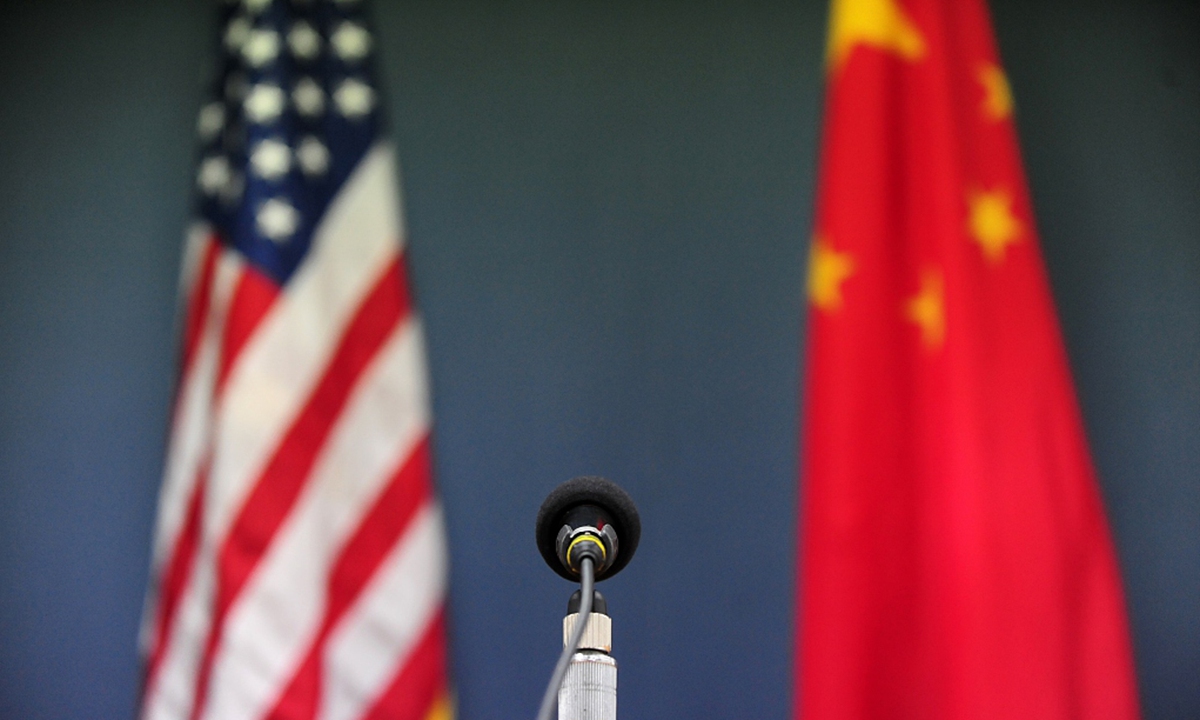China slaps reciprocal restrictions on six more US media outlets
By Cao Siqi and Shan Jie Source: Global Times Published: 2020/10/26 22:20:53

China US Photo: VCG
China demanded that China-based branches of six US media in the country declare in written form the information about their staff, finance, operation and real estate in China within 7 days from Monday in a reciprocal measure against US decision to designate six more Chinese media as "foreign missions" on Wednesday.
The six US media outlets include American Broadcasting Corporation, The Los Angeles Times, Minnesota Public Radio, Bureau of National Affairs, Newsweek and Feature Story News.
The above-mentioned measures are entirely necessary and reciprocal countermeasures that China is compelled to take in response to the unreasonable oppression the Chinese media organizations experience in the US. They are legitimate and justified self-defense in every sense, Chinese Foreign Ministry Spokesperson Zhao Lijian said in a statement published on its website on Monday night.
In recent years, the US government has placed unwarranted restrictions on Chinese media agencies and personnel in the US, purposely made things difficult for their normal reporting assignments, and subjected them to growing discrimination and politically-motivated oppression, Zhao said.
"With regard to its designation of six more Chinese media outlets as "foreign missions", I already stated China's solemn position last week. We urge the US to change course, undo the damage and revoke the designation of the six Chinese media outlets. However, the US side, in total disregard of China's legitimate and reasonable demand and solemn warning, insistently ramped up political repression and stigmatization of Chinese media agencies and personnel," Zhao said.
What the US has done is exclusively targeting Chinese media organizations driven by the Cold War mentality and ideological bias. It has seriously tarnished the reputation and image of Chinese media organizations, seriously affected their normal operation in the US and seriously disrupted people-to-people and cultural exchanges between the two countries, the statement said.
It has therefore exposed the hypocrisy of the self-styled advocate of press freedom. China urges the US to immediately change course, undo the damage, and stop its political oppression and arbitrary restrictions on Chinese media organizations. Should it choose to go further down the wrong path, it could expect more countermeasures from China, it said.
Only 9 days to the US election, China announced two reciprocal countermeasures in one day, which shows that no matter who will be elected president, as long as he damages China's interests, China will take countermeasures, Lü Xiang, a research fellow on US studies at the Chinese Academy of Social Sciences in Beijing, told the Global Times on Monday.
"The US has been behaving unfriendly to China and making discriminatory rules against China… So it is reasonable for China to take countermeasures," Lü said. "But the countermeasure on another six US media outlets in China is a brief interlude in China-US tensions, as the US government has been in an unprecedented mess and many of its policies are absurd."
This is the second countermeasure that China has announced on Monday against the reckless US move a week ahead of the presidential election.
China announced to sanction firms including Lockheed Martin, Boeing Defense, Raytheon as well as individuals and entities that are involved in arms sales to the island of Taiwan. The latest response with unprecedented scale and strength against firms, individuals and entities involved in the arms sale came after an event in China to commemorate a war against US aggression in Korea 70 years ago.
Analysts believed it showed China's decisions won't be disturbed by the US, and any act that undermines China's interests is bound to face serious consequences.
The "media war" initiated by the US has been constantly escalating. The US attempted to pressure China into making so-called "changes." But it has proved that the strategy won't work and unreasonable suppression on China will definitely face firm countermeasures, Li Haidong, a professor at the Institute of International Relations of the China Foreign Affairs University, told the Global Times on Monday.
Li stressed that China's recent countermeasures highlighted a major shift in China's diplomatic approach toward the US - that is it does not compromise when it comes to protecting its interests. He predicted that the "media war" and other areas of the China-US relationships could fall into the same trap as the "trade war," where toe-to-toe measures persisted before both sides eventually reach a temporary deal.
In the following three months, the US government might take more actions to contain China. Also, there will be no progress and breakthroughs in any area of bilateral relations. But no matter who is elected US president, the room for him to flexibly handle the policy toward China will be narrowed, Li said.
"China will make its policies toward the US according to its own interests and rhythm, and will not be affected by the US domestic agenda," Li added.